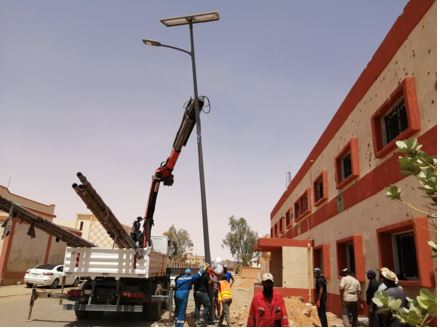By Sami Zaptia.

London, 4 December 2020:
The United Nations Development Programme (UNDP) is promoting clean energy through solar streetlights in Libya.
This comes as part of its wider remit to achieve the eradication of poverty, and the reduction of inequalities and exclusion while protecting the planet. It helps countries to develop policies, leadership skills, and build resilience in order to sustain development results.
Through its current Strategic Plan (2018-2021), it is responding to a wide diversity of countries with several issues that are classified in three development contexts:
- Eradicate poverty in all its forms and dimensions
- Accelerate structural transformations
- Build resilience to shocks and crises.
In order to better focus on its resources and expertise to deliver on the 2030 Agenda for Sustainable Development Goals, the UNDP has defined a set of approaches called Signature Solutions that include poverty, governance, resilience, environment, energy and gender.
Energy solution
The UNDP says that access to clean and affordable energy is a critical enabler for sustainable development whether it be for nutrition, transport, education or economic opportunity. To this end, it is working on increasing energy access, promoting renewable energy and enhancing energy efficiency in a manner that is inclusive and responsive to the needs of different sectors of the population, in line with the seventh Sustainable Development Goal (SDG7): Ensure access to affordable, reliable, sustainable and modern energy for all.
This transition to clean and affordable energy will help countries to reduce the impacts of indoor and outdoor air pollution, particularly in rapidly developing urban areas. In crisis and post-crisis situations, this solution focuses on re-establishing energy access where it has been lost, strengthening risk-informed zero-carbon development.
Great potential for renewable energy
As a renewable energy, solar energy, is an efficient alternative source of power which reduces the carbon footprint and can help a country to insulate from price fluctuations in global energy markets. While oil and gas today dominate as energy sources in Libya, there is a strong potential for solar power in the country. More than 88% of its territory is desert, the country has long hours of sunshine and its proximity to the Tropic of Cancer ensures great solar radiation. This solar energy solution decreases public buildings’ reliance on the devastated national grid ensuring a continuous -and easy to maintain – source of electricity.
More cities with solar streetlights
UNDP’s goal in Libya is to support the authorities to improve access to basic services through ensuring constant and cost-effective access to electricity, while also mitigating the impact of climate change and advancing multiple Sustainable Development Goals. People in Libya need electricity; however, besides providing generators, the UNDP is also providing a clean alternative; solar energy. In this way, the UNDP says it is responding to the urgent needs of the people and providing a long term and sustainable solution.
This initiative is one of the hundreds of projects that the Stabilization Facility for Libya (SFL), led by National Institutions and implemented by the UNDP, with support from 13 international partners and the Government of Libya, is undertaken in the West, East, and South of Libya.
The UNDP, through the SFL has undertaken over 375 investment projects in Sirte, Tripoli, Benghazi, Kikla, Bani Walid, Sebha, Ubari, Ghat, Derna, Kufra and Tawergha, restoring power grids and water and sewage networks; repairing primary and secondary schools and rehabilitating universities; hospitals and clinics; enabling municipalities to clear garbage from neglected streets; providing vital equipment, including ambulances to health departments; as well as providing for other municipal needs related to civil defence, public health, access to justice and more
Between 2016 and 2017, the UNDP installed solar panels for back-up power in 15 different hospitals across Libya as well as one municipality building.
In January 2020, through the Stabilization Facility for Libya, UNDP installed 40 lighting poles along 2 km in Tawergha’s streets that are powered by renewable solar energy. A second phase is in development and will ultimately provide 150 poles along approximatively 3.5 km.
In Benghazi, the SFL has already installed 377 solar lighting poles and it is installing now 450 more along a distance of approximatively 16 km.
Installation has already started in Kufra streets where 310 solar light poles are being set up along 9.8 km while works will start in a near future in Sebha streets to install 1,050 poles on about 14 km.
UNDP’s Stabilization Facility for Libya is now installing 460 solar light poles along 11 km in Ubari’s streets. The work should be completed by the end of the current year.
UNDP/SFL’s solar streetlight projects
| Area/city | Status | Distance km | Sectors | |
| 1 | Benghazi | Ongoing | 16 | 7 |
| 2 | Sebha | Not started | 14 | 12 |
| 3 | Ubari | Ongoing | 11 | 7 |
| 4 | Tawergha | Completed | 3.5 | 2 |
| 5 | Kufra | Ongoing | 9.8 | 2 |
” These new projects are not only contributing to achieve the 2030 Agenda and the SDG7, but are also helping to improve security and reduce crimes, facilitating economic activities thus enhancing social cohesion and benefitting people in different municipalities across Libya”, said UNDP Resident Representative in Libya, Mr. Gerardo Noto.






